Kim Wilson (who Santa Barbarans might know as “Goleta Slim”) is the lead vocalist and harmonica player for The Fabulous Thunderbirds, whose blues rock has thrilled audiences for decades. The band’s commercial peak came in the 1980’s with the hit songs “Tuff Enuff” and “Wrap It Up”, which helped to launch a blues revival. The latest release by The Fabulous Thunderbirds is called On The Verge. Wilson has also recorded with other artists including Bonnie Raitt, Eric Clapton, Mark Knopfler, and James Cotton.
The following interview was for a preview article for the Blues at the Crossroads Two concert at UC Santa Barbara on 3/12/13, which is a tribute to the music of Muddy Waters and Howlin’ Wolf. It was done by phone late at night on 2/27/13.
Jeff Moehlis: What can we look forward to at the upcoming show in Santa Barbara?
Kim Wilson: It’s kind of a spontaneous thing. We definitely have a setlist, but we do it a little bit different every night. It’s a really nice show, a very nice show. It’s a lot of music by mostly Muddy Waters and Howlin’ Wolf.
JM: Can you tell me a little bit about the guest musicians who will be joining you?
KW: We have Tinsley Ellis, who’s a really great player. I’ve known him for a long time, as well as Bob Margolin. I met him with Muddy Waters back in the 70’s. They’re both great. And then we have Jody Williams who’s one of the most incredible guitarists of all time. Of course, James Cotton, and the Fabulous Thunderbirds on top of that. They’ll be the backing group for all of the musicians. And we get our own set, too. It’s a pretty well-rounded show, not any extreme youngsters in the bunch. It’s a very good show.
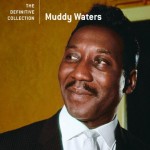
JM: I understand that you knew Muddy Waters. Can you tell me about your interactions with him?
KW: Muddy was kind of like a dad to me, like a second father. He was very, very generous to me. I grew up in Santa Barbara. I was playing with a lot of different people in Santa Barbara, a lot of the old guys, you know. Eddie Taylor, Pee Wee Crayton, Albert Collins, George “Harmonica” Smith, a bunch of people.
But I didn’t meet Muddy until I got to Texas. It was just a fantastic experience. The guy was very generous with me. He talked me up all over the world. A lot of the stuff that I did with him is really not stuff I like to talk about that much, to be honest with you. Because it’s pre-YouTube, and I like having these things to myself.
But he was very, very generous, how he spoke about me to the press from very early on. I think it was a big thing for me, a big thing for me in the music world. I’m not sure how much it got across to people because Muddy Waters at that time, and really until way later, was not a world famous musician himself really. It was a crazy thing. It took people like Clapton and the Rolling Stones to really bring him out, and get his name out there into the mainstream.
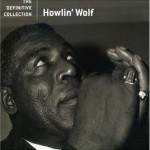
JM: Did you ever interact with Howlin’ Wolf?
KW: I did a little bit towards the end of his life. I met him up in Seattle at a show that I did right before I moved to Texas. That was like 1974, I believe. We did a show with him and Albert Collins, Margie Evans, John Lee Hooker. I was a pretty intense deal. He wasn’t really, really outgoing to me. But he talked about me when I wasn’t in the room. It was the craziest thing ever. I was just kid. I didn’t know the Wolf that well, but I got to know a lot of people like Hubert Sumlin of course, and Eddie Shaw, people like that who played with the Wolf. But the Wolf himself, not very much.
JM: I associate you with Texas, but like you said you grew up around here, in Santa Barbara and Goleta. What was your Santa Barbara experience like? What there a good music scene going here?
KW: It was a very good scene, actually. Isla Vista was really booming. There was just a lot of stuff going on all over town. A lot of festivals, a lot of club shows. A lot of people playing.
![]()
There was a place out on Hollister called The Headband. It was an incredible place for music. It was just packed. Great people like Big Joe Turner. That’s where I met George “Harmonica” Smith, that’s where I met people like Jimmy Reed the first time. Albert Collins played out there. Really, really a lot of people played there. I remember seeing Charlie Musselwhite out there. I would see these guys all over town back then.
There was a place out on the campus, Robertson Gym – they used to have a lot of people play out there. I would see B.B. King and Freddie King playing together at Robertson Gym back in the day. A long time ago, that was the late 60’s.
JM: Can you tell me a little bit about the early days of The Fabulous Thunderbirds?
KW: Do we really have to talk about that? [laughs]
JM: No we don’t.
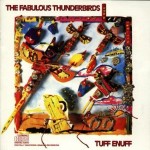
KW: I mean, I’m more interested in what’s going on now and not what was going on then. But I will say this. We had a good start, and we impressed a lot of people. We got signed relatively quickly, and then we had the big deal in the 80’s. That’s when we saw some pretty big records. But, you know, I think that’s [long pause] ancient history.
JM: What advice would you give to an aspiring musician?
KW: Well, I would say this. Learn how to have your own voice. Learn how to sing, for one thing. Learn how to have your own voice in music. Other than that, just keep plugging away at it and having a good time doing it. It’s one of those things where you aren’t ever really sure you’re going to have decent success with it. So you’re better off just having fun with it. And if you do that, you’re able to please yourself. And if you can please yourself, you’re bound to please a few other people.
It’s a different world these days, obviously. It’s a lot more difficult than it was when I was a kid. In fact, I didn’t even really make any kind of hit records until I was in my 30’s. I think that it’s just very important to have a good time with it.
I wouldn’t really dwell on having a lot of success. People try and have success with it as opposed to having fun with it. And sometimes they do have some success. But in the end, I can’t see it working out for you, you know what I mean, doing it that way. The longevity part of it, being the player, that’s the thing. And you’re not going to be able to get far with it legitimately if you’re going for nothing but money. That’s my opinion anyway. Some people, they think that money, that’s it. But I think that there’s no way you’re going to have the kind of longevity, let’s say, that I’ve had, if you’re going to think only about money. I just don’t think it’s going to happen for you. You may make some money, but you’re not going to be, like, the player that you should be. It’s a funny deal. It’s hard to talk about it in this day and age. I’ve always dwelled on prestige, and then money, then a living. But if can’t have prestige, you really can’t have a legitimate lifestyle in music. You’ve got to have the prestige.
JM: Obvious you’re touring with Blues at the Crossroads. Do you have any other projects in the works?
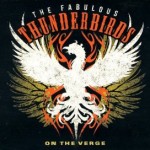
KW: We’ve got a new Fabulous Thunderbirds CD. Actually, that is already doing kind of well at radio, I heard. I heard it went to #7 this week. That’s a good thing. I’ll just keep working that. I’ll be doing more Blues Band records in the future, but I really wan to see this T-Bird thing through.
I’m going up to Canada, actually, with the Blues All-Stars this weekend, in fact leaving tomorrow. But I’m only doing two shows up there, then I’m coming back and I’m going to finish up the last leg of this Blues at the Crossroads thing. Then it’s kind of up for grabs. I know there’s a lot of things in the books right now. But we’ve got a new agency, APA, they’re a very, very good agency. And new management, which is really a great thing – Glen Parrish, he used to be Stevie Nicks’ personal manager. It’s a pretty good situation right now.
But you’ve got to stay focused. You can’t get ahead of yourself in this game these days. You’ve just got to work it, work it, work it, get yourself in front of a lot of people, and try and make an impact on some new audiences.
JM: Where are you speaking to me from?
KW: I’m down in Southern California. That’s where I live.

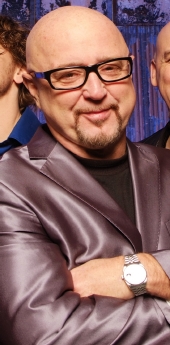
Discussion
No comments for “Interview: Kim Wilson”